Testimonies
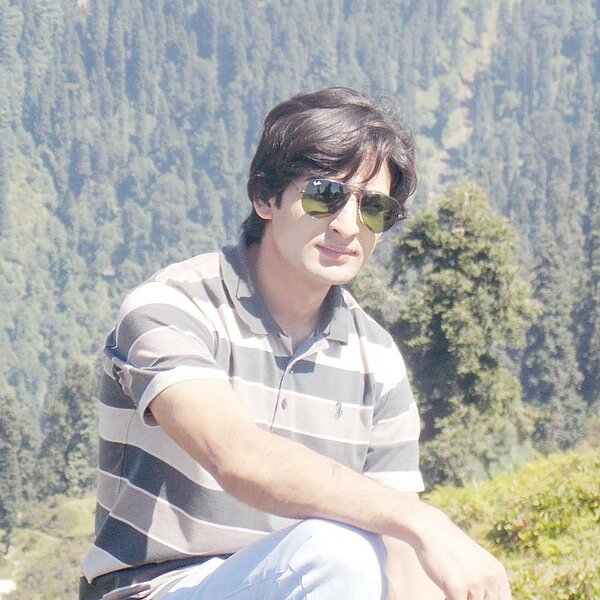
Ali RAZA
I was born amidst the snow-covered majestic mountains of Gilgit in Northern Pakistan, where I spent my early years studying in the serene, snow-capped landscape until high school. My academic journey then took me to the ancient city of Taxila, where I pursued a degree in computer engineering at UET Taxila. Eager for new adventures, I set off for South Korea to pursue my Master’s, immersing myself in a rich culture and forging lasting friendships. My quest for knowledge then led me to France and the UK, where I embarked on a thrilling Dual PhD program focused on the cutting-edge fields of cybersecurity and AI-based healthcare
My passion for exploring the world and diving into research has always driven me. When I discovered the co-supervised PhD program between the University of Lille and the University of Kent, it felt like a dream come true, perfectly blending my love for travel and academic inquiry. That's why I eagerly decided to embark on this exciting journey
My lifelong passion has been creating a safer world for everyone, which inspired me to delve into cybersecurity and explainable AI in healthcare, striving to foster trust and accountability for users. Even after transitioning to the industry, I remain dedicated to mentoring numerous PhD and postdoctoral students, eager to share my knowledge with brilliant young minds and continue contributing to a safer world. Additionally, I am deeply involved with a non-profit organization that opens the doors of free education to underprivileged students. While it's a modest effort now, I dream of expanding its impact to reach even more young learners in the future.
Moving to Kent was a delight, allowing me to explore its stunning landscapes and engage with many inspiring individuals, both on and off campus. The vibrant community of researchers and colleagues provided invaluable insights and made my experience truly remarkable. This incredible journey of growth and discovery wouldn't have been possible without the chance to move to Kent. A huge shout-out to everyone who made it happen!
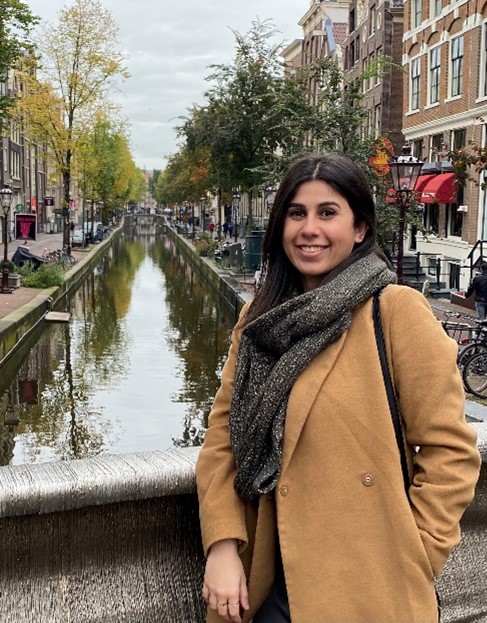
Sandy AL BACHA
I am originally Lebanese, raised in the beautiful Mountains of Lebanon. I have always been passionate about Chemistry and have always known that it is what I’ll pursue in life. I got my Bachelors in General Chemistry while I was in Lebanon, in September 2019 I moved to Lille and got my Master’s degree in Chemistry of materials for the energy and the environment.
Applying for a co-supervised PhD is one of the best decisions I have ever made as it is very interesting to interact and learn from professors coming from different backgrounds and universities, simultaneously to explore different working environments.
My thesis project consists on designing and understanding polar oxysulfide materials and their capacity as photocatalysts, especially in solar water-splitting to get renewable hydrogen. Continue on exploring and researching is what I am hoping to do in the future.
Spending part of my project in Kent has not only helped me think outside the box scientifically but also introduced me to various cultures and traditions.
François MONNET
Après une licence en Biologie-Écologie à l’Université Savoie Mont Blanc, j’ai poursuivie mes études avec un master en Biologie Évolutive à l’université de Montpellier.
J’ai décidé de postuler pour un doctorat en cotutelle entre l'Université de Lille et l'Université de Gent car le sujet, l’encadrement et la possibilité de découvrir et travailler avec deux laboratoires de pays différents me semblait être une très bonne opportunité pour mon doctorat.
Je m’intéresse dans le cadre de ma recherche à la spéciation (l’apparition de nouvelles espèces), et plus précisément à la relation entre barrières reproductives (régions du génome pour lesquelles l’échange de gènes est plus difficiles,voir impossible, entre deux populations) et divergence (niveau de différence entre les génomes de deux populations). J’espère pouvoir poursuivre ma carrière dans la recherche et à terme obtenir un poste d’enseignant-chercheur.
Dans le cadre de ma cotutelle, j’ai eu l’occasion d’effectuer une mobilité à l’université de Gent qui m’a permis de découvrir un mode de fonctionnement de laboratoire différent de celui rencontré en France, ainsi que de rencontrer et d’échanger avec les chercheurs du laboratoire d'accueil (VIB - UGent Center for Plant Systems Biology).
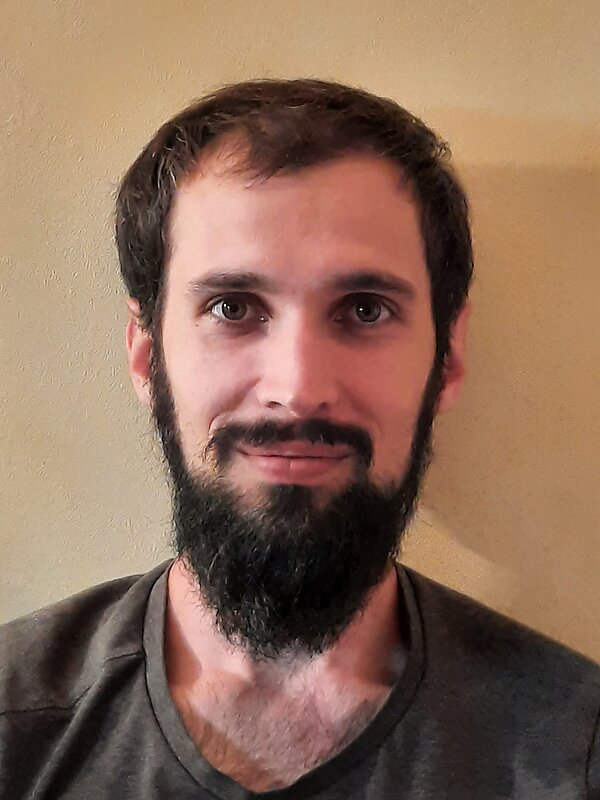
Diego Fernando GARCIA DEL RIO
I´m from Mexico City, Mexico. I obtained a BSc. as Chemical Pharmaceutical Biologist at La Salle University (Mexico). I did an M.Sc. in Advanced Spectroscopy in Chemistry from the University of Leipzig (Germany) and the University of Lille (France).
I decided to apply to this Joint Ph.D. because the topic was very interesting to me. Also, as in my master's, mobility between universities provided me with soft skills that I think are important to my career. for instance, adaptability, multicultural networking, effective communication, and openness to others are some of the skills that I wanted to develop continuously.
My research is about Alternative Proteins (AltProts) and their involvement in ovarian cancer. These AltProts are translated from alternative open reading frames, which cracks the molecular biology dogma of monocistronic eukaryotic DNA. Moreover, the involvement of a few AltProts in different pathologies, especially in cancer, has been shown in recent years. Ovarian cancer has very unspecific symptomatology and is usually diagnosed in a late-stage with a poor prognosis. This leads us to use a proteointeractomic approach for searching for a possible biomarker or drugable pathway in which AltProts can be taking part.
The collaboration between Ghent has given another view of the current development of the project, more ideas, and ways to tackle the challenges faced. Also, it brought interaction with other Ph.D. candidates and it opens the door for using targeted interactomics techniques that were optimized by the VIB in Ghent like BioID and ViroTrap.
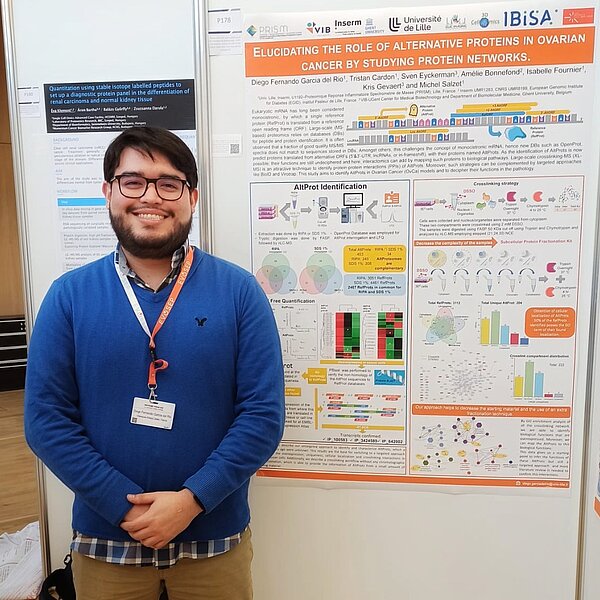
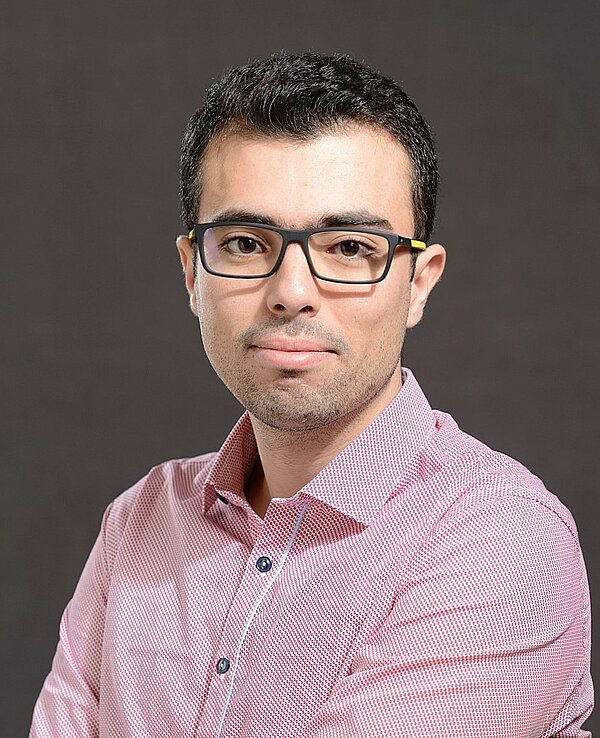
Ayoub AROUA
I am from Tunisia.
I joined the University of Lille in 2015 for initially a BSc degree in Electronics and Electrical Engineering, followed by an MSc in Automatic Control and Electrical Systems, with a major in Electric and Smart Vehicles. In 2020, I was laureate of the I-SITE ULNE joint doctorates program to peruse a joint Ph.D. between the University of Lille and Ghent University in Belgium.
Before the Ph.D., I had the opportunity to be involved in collaborative research work between both universities as part of my master thesis. As a matter of fact, I received a mobility grant from I-SITE ULNE to conduct my research work at Ghent University at that time. So, I have a history of working with both research teams. I have found creative, forward-thinking, and innovative research teams that are involved in different regional, national, and European projects. As an example, my thesis is carried out within the framework of the interdisciplinary research program CUMIN (Campus of University with Mobility based on Innovation and carbon Neutrality), in which various universities and research teams are involved. This is exactly the research community in that I was eager to do a Ph.D. Most importantly, the research subject and its ambitions were crucial factors that make me decide to apply for the co-supervised Ph.D. between both universities.
My research is about developing an innovative scaling method for electrical powertrain components, namely the power electronic converter, electrical motor, and gearbox. Simply put, the idea is to start from a reference component and scale (i.e. change) its geometry to derive other components, but with different power ratings which can be used in different electric vehicles (e.g. light vehicles, vans, trucks, etc…). The scaling methodology should predict the performance of a scaled design based on the data from the reference design, making it needless to redo time-consuming steps. This allows reducing the time-to-market of electrical powertrains by accelerating the design process. Moreover, the outcomes of this thesis will contribute to reaching the goal of the CUMIN project, as different electric vehicles are required to face the challenge of more sustainable mobility in urban centers.
Once I complete my PhD., I am interested in research positions either in universities (why not continue the collaboration between both universities as a postdoctoral researcher) or in industries. For me, this could be a great opportunity to continue research and develop innovative projects related to green mobility, as the path to full decarbonization of the transport sector remains long. I would like to continue working on innovative powertrains and play an active role in a dynamic environment that seeks to find solutions to future mobility with high efficiency, reduced costs, and high comfort. Managing and leading teams and projects are also one of the objectives of my career.
The mobility at Ghent University is a beneficial and very important experience, which has allowed me to interact with scientific researchers with different cultural research approaches and most importantly different skill sets. Additionally, the mobility at Ghent University gives me greater access to resources and complementary facilities to carry out my research than they would have in a single university.